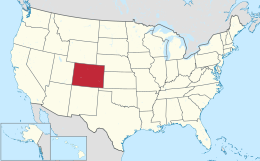More languages
More actions
This article is missing sources. Please do not take all information in this article uncritically, since it may be incorrect. If you have a source for this page, you can add it by making an edit. |
| Colorado | |
|---|---|
Motto: Nil sine numine Nothing without providence | |
Anthem: Where the Columbines Grow &
Rocky Mountain High | |
 | |
| Capital and largest city | Denver |
| Official languages | English |
| Area | |
• Total | 269,601 km² (8th) |
• Land | 268,875 km² |
• Water | 962 km² |
| Population | |
• 2023 estimate | 5,877,610 (21st) |
• Density | 21.72 km² (37th) |
Website www.colorado.gov | |
Colorado is a state situated in the heart of the United States that has a rich history that intersects with various socio-political movements. It is the 21st most populous state in the country with a population estimated to be around 5,877,610 people in 2023.[1] It is known for its mountain ranges, cultural diversity, and its progressive political stances on issues such as marijuana legalization and LGBTQ+ rights.
History[edit | edit source]
Indigenous peoples and settler colonization[edit | edit source]

The history of Colorado begins with the vibrant presence of Indigenous Peoples communities, each with its distinct cultures, languages, and ways of life. The encounter with European colonizers marked the onset of settler encroachment, leading to the dispossession of indigenous lands and the imposition of foreign socio-economic structures.
Capitalist exploitation and resource extraction[edit | edit source]
Imperialism in Colorado took the form of capitalist expansion, driven by the extraction of valuable resources from indigenous lands. The quest for minerals, timber, and fertile soil fueled the capitalist engine, often at the expense of indigenous communities.
National oppression and cultural genocide[edit | edit source]
Imperialist forces not only sought to control the land and resources but also aimed at suppressing indigenous cultures and imposing Eurocentric norms. The imposition of boarding schools, forced assimilation policies, and the eradication of indigenous languages were mechanisms of cultural subjugation.
Labor movement[edit | edit source]
Colorado has a history of labor struggles, including events such as the Ludlow Massacre in 1914, which stands as a pivotal moment in Colorado's labor history and a significant chapter in the broader class struggle against capitalist exploitation. Beyond Ludlow, Colorado witnessed a series of labor conflicts collectively known as the Colorado Labor Wars. These conflicts involved battles between labor unions, primarily the United Mine Workers (UMW), and powerful corporate interests in the mining industry. The struggle for workers' rights, fair wages, and improved working conditions became a focal point of contention.
References[edit | edit source]
- ↑ "United States Census Quick Facts Colorado". Census.gov. Archived from the original on 01/12/2024. Retrieved 01/12/2024.


